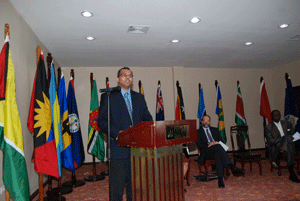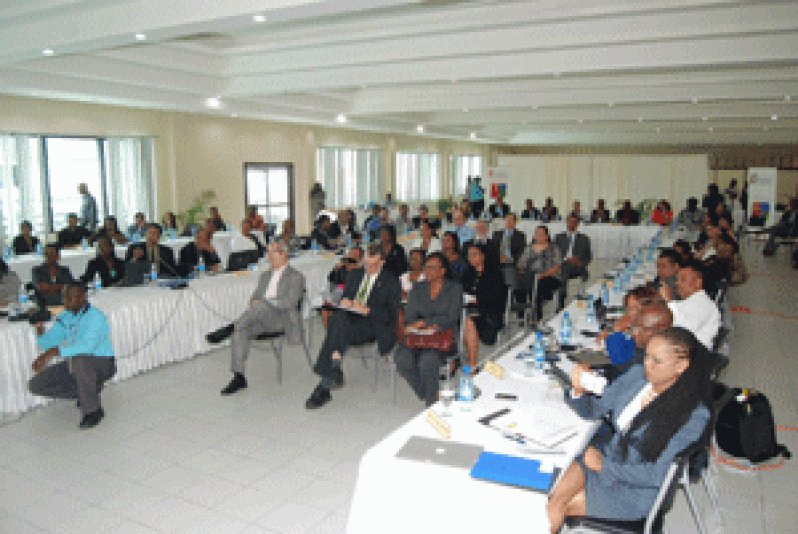 The challenge was thrown out by Guyana’s Minister of Culture, Youth and Sport, Dr. Frank Anthony at the opening of the Twenty-Third Meeting of the Council for Human and Social Development (COHSOD), convened under the theme ‘Charting Our Future: An Integrated Development Agenda for Children and Youth’.
The challenge was thrown out by Guyana’s Minister of Culture, Youth and Sport, Dr. Frank Anthony at the opening of the Twenty-Third Meeting of the Council for Human and Social Development (COHSOD), convened under the theme ‘Charting Our Future: An Integrated Development Agenda for Children and Youth’.The two-day conference is taking place at the Princess Hotel, Providence, East Bank Demerara, where Dr Anthony is in the Chair.
He said: “We are here for a very special meeting and the ultimate aim is working with and for our children in making the Region a better place for them to live, grow and develop.”
Making the CARICOM Region fit for children should be all of everybody’s business, Anthony maintained.
He said the fact that member states are very well represented at this forum is a clear indication of their conviction that a holistic approach is absolutely necessary to effectively implement the regional priority actions pertaining to children and youth, as identified in the Regional Framework for Action for Children.

GOALS
He said the goals for these priority actions are anchored in the work initiated in 2002, during the first Special Meeting of the COHSOD on Children and, again, at the last Special caucus in Guyana, March 2008.
Anthony observed that, since 2008, the Region has achieved and recorded results with significant impact and improvement in the six agreed thematic areas of the Regional Framework of Action for Children – early childhood development, child protection, HIV/AIDS, education, reduction in infant mortality and maternal mortality.
He noted: “We are here, once again in 2012, to review the Regional Framework, to assess the achievements made, the challenges encountered in the implementation and to identify the gaps that are yet to be filled in those areas.”
Anthony said this critical review of the framework will help determine how well they have been doing in their endeavour to meet the commitments made to the Region’s children, adolescents and youth.
He continued: “We are also here to take into consideration the changing times in which we now live and work with its numerous challenges and the impact that these will have on the decisions that we make here and now.”
The Minister said, notwithstanding the significant gains made in the thematic areas: “We must be cognisant of the fact that these are indeed challenging times for small and developing States like ours.
“And we will continue to face very serious problems, compounded by the impact of unacceptable levels of increase of crime and violence, the effects of climate change and migration and what these would have on our children and their development,” he said.
Anthony said the increase in child sex abuse, particularly intra-familial, teenage pregnancies, childhood obesity and homicides among boys 15 to 18 years, are cause for concern and they must not remove from the agenda, the issue of HIV and AIDS.
He said, with its focus on children and youth, the COHSOD meeting will be discussing the issues relating to some of the thematic areas within the Regional Framework for Action for Children.
These include child protection with an emphasis on violence against children in all situations; early childhood development and, in particular, the Region’s youngest citizens from zero to three; issues of child health; youth affairs; advocacy and public education systems to protect children.
He said they will also be paying special attention to actions that give life to the commitments made by member states in the Declaration of Paramaribo, as they consider the CARICOM Youth Development Goals and Action Plan.
IMPORTANCE
“The effects of climate change on our children is an issue of particular interest to Guyana and of critical importance to you as well,” Anthony pointed out.
He reminded that the Region is prone to natural disasters, such as hurricanes, flooding and now it seems earthquakes, and any developmental gains made can be undermined by these natural disasters.
“It is my hope that, during the next period, greater attention will be placed on identifying the kinds of initiatives needed to protect and support the vulnerable children, in particular, those that might experience situations of emergencies,” Anthony said.
He said he also hopes that decisions will be taken to endorse the development of policies and strategies that will help to advocate the work being done in early childhood development and child protection, especially against violence in all its forms and situations.
Minister Anthony said the delegates must also take a stand against child labour, human trafficking, discrimination and neglect.
“No one government, organisation, or agency can do it alone. It has to be a collaborative effort with all the relevant stakeholders, schools, homes, churches, community groups, all the institutions in the society making a contribution,” he insisted.
“However, the medium and the long term value of COHSOD XXIII will be determined and measured by the political commitment with which we implement the decisions that we will take at this COHSOD,” Anthony cautioned.
He said: “Let us do the things that could not be done and work collaboratively to make our Caribbean a safer and a better place for our children.”
ENSURE
Dean of the CARICOM Youth Ambassadors Corps, Mr. Dwayne Gutzmer, in his remarks, said the members told him to ensure that he emphasises that young people need to be a part and engaged from the inception of programmes, policies and activities.
“They told me also to emphasise the point coming out of the CARICOM Commission on Youth Development (CCYD) report, that our young people of the Region are assets to be developed and not problems to be solved,” he said.
Gutzmer said young people of the Region are ready to lead, to act and highlight the positive contributions they are making and he encouraged them “to continue working with us as we chart our future together.”
Also speaking to the gathering was United Nations Children’s Fund (UNICEF) Representative in Guyana and Suriname, Mr. Sulieman Braimoh, who noted that this agency is a longstanding partner of CARICOM and reaffirmed its commitment to that partnership.
He wished COHSOD successful deliberations that will help to accelerate the fulfilment of child rights in the sub-Region.



.jpg)









